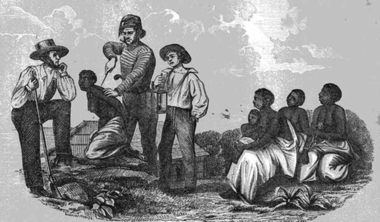America’s lasting stain

by Rob Howard
Political Columnist
In 1619, a Dutch ship landed at Jamestown, Virginia with 20 African slaves. I would bet that, if you asked your friends, they would say slavery was only practiced in the South. Not so. Slavery spread throughout the 13 colonies. Only after 150 years did blacks in New England begin to petition for their freedom.
When the Constitution was drafted in 1787 and ratified by nine states in 1788, making it the effective governing document of the country, it contained provisions that counted slaves as 3/5 of a person when determining how many Representatives a state would have in Congress, and in the Electoral College. There is a clause in the Constitution that requires escaped slaves to be returned to their masters.
In 1789, when George Washington took office as President, there were eight slave states, including New York, New Jersey, Maryland and Delaware. Controversy over slavery raged in US politics for another 72 years, until the South seceded and the Civil War began.
Slavery existed in our country for 244 years before the Emancipation Proclamation in 1863 started the country on the path to total abolition of this incredible stain on our nation’s history – 90 years more than the 154 years since slavery was abolished.
Only the naïve would think that an end to slavery settled the question of how Americans treated their African American fellow citizens. Nearly 100 years would pass before real progress was made toward equal treatment. In the meantime, African Americans were oppressed by law, by Supreme Court decision, and by violence, murder and fear.
They could not vote. Their schools were unequal. Their job opportunities limited. Their pay far below what whites were paid. They could not marry outside their race. This oppression is generally referred to as ‘Jim Crow Laws’. Most of us think this was peculiar to the Southern states. It was not.
Besides the states of the Confederacy, Arizona, New Mexico, Oklahoma, Kansas, Missouri, Indiana, Kentucky, West Virginia, Maryland, Delaware and Wyoming, all had such laws.
For the most part, these laws were overturned by Supreme Court decisions such as Brown v. Board of Educationin 1954, which ruled school segregation unconstitutional, and Loving v. Virginia in 1967, which ended laws forbidding marriage outside a person’s race. And by legislation such as the Civil Rights Act of 1964 and the Voting Rights Act of 1965.
And that settled the problem right? And if it didn’t, well, we elected an African American man as President in 2008 and reelected him in 2012. Aren’t we living in a “post-racial” America?
No, we are not. And several things point to the fact that the stain of slavery still poisons how we deal with race in our country. Some facts and observations:
Across the country, black people are incarcerated 580 percent of the rate that white people experience. I didn’t stutter. Per 100,000 people in each group, 380 white people are incarcerated against 2,207 black people. It gets worse in our region. In Oklahoma, the rate per 100,000 blacks is 3,796; Kansas is 3,306; Arkansas, 2,432; and Missouri, 2,337.
If we look at our schools, experts say that schools are more segregated now than they were 40 years ago. And the same experts note that this is not because of laws but because of poverty. But if you pull up the demographics for schools in your district, you may be surprised. A quick glance at Oklahoma City’s school district shows that almost all high schools have overwhelming majorities of one race or another. If that’s not segregation, I’m not sure what it is.
Poverty does play a role in the segregation. Real median household income for black families is $36,898, for white families the income is $62,950. In other words, white families make 70 percent more than black families.
And you can’t tell me that race doesn’t play a part in those figures. I think many people, maybe even a majority of people, think black people are somehow worth less in our society. That it is somehow their fault.
It is not a black person’s fault that their ancestors were captured in their native Africa and brought to America in chains. It is not their fault that they were treated as objects and property rather than as human beings. It is not their fault that many if not most suffered unspeakable cruelty at the hand of their masters.
The stain of slavery casts a pall over our politics, our society, and our relations with people who are different from us. We need to wake up, acknowledge that stain and work on erasing it from our lives and our country.
Copyright 2017 The Gayly – February 20, 2017 @ 9:40 a.m.





